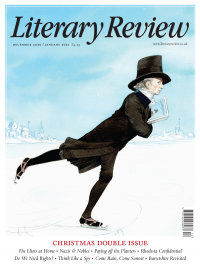Susan Owens
Quick to Draw
The Art of Ruskin and the Spirit of Place
By John Dixon Hunt
Reaktion Books 288pp £35
A sketch of a mountain crag; a list of towns visited (over fifty); notes of subjects to investigate further – all of these swarm inkily around a single page in a notebook, reproduced here, kept by the young John Ruskin during a family holiday. As he got older, his intellectual curiosity only increased. When his writings were collected together after his death in 1900 they filled thirty-nine hefty volumes, and on top of that he habitually drew the world around him, creating a beautiful and revealing archive of the places and things he thought worth recording. One commentator quoted in The Art of Ruskin and the Spirit of Place wishes he ‘had drawn more and written less’ – a view that may quietly be held by many others – but even so, Ruskin rarely hesitated to reach for his sketchbook. There is no catalogue raisonné of his drawings, but if it existed libraries would have to clear substantial space on their shelves for it.
John Dixon Hunt remarks in his introduction that it takes an immense effort to see Ruskin ‘whole’; I wonder whether it is possible at all. But just as he drew in order to understand the world that fascinated him so much (‘unless I draw a bit of a thing,’ he once wrote, ‘I never arrive at conclusions to which I can altogether trust’), the drawings he made illuminate the man. In this lucid study of the great Victorian polymath’s visual imagination, Hunt uses these sketches, studies and scenes to show us around Ruskin’s curious mind.
We begin with Ruskin unlearning the formulas he had absorbed from drawing masters and artists whose work he admired. Among the latter was Samuel Prout, whose picturesque watercolours of towns, teeming with colourful incident, were a shaping influence on the young Ruskin, who often prettified scenes for the sake of

Sign Up to our newsletter
Receive free articles, highlights from the archive, news, details of prizes, and much more.@Lit_Review
Follow Literary Review on Twitter
Twitter Feed
Under its longest-serving editor, Graydon Carter, Vanity Fair was that rare thing – a New York society magazine that published serious journalism.
@PeterPeteryork looks at what Carter got right.
Peter York - Deluxe Editions
Peter York: Deluxe Editions - When the Going Was Good: An Editor’s Adventures During the Last Golden Age of Magazines by Graydon Carter
literaryreview.co.uk
Henry James returned to America in 1904 with three objectives: to see his brother William, to deliver a series of lectures on Balzac, and to gather material for a pair of books about modern America.
Peter Rose follows James out west.
Peter Rose - The Restless Analyst
Peter Rose: The Restless Analyst - Henry James Comes Home: Rediscovering America in the Gilded Age by Peter Brooks...
literaryreview.co.uk
Vladimir Putin served his apprenticeship in the KGB toward the end of the Cold War, a period during which Western societies were infiltrated by so-called 'illegals'.
Piers Brendon examines how the culture of Soviet spycraft shaped his thinking.
Piers Brendon - Tinker, Tailor, Sleeper, Troll
Piers Brendon: Tinker, Tailor, Sleeper, Troll - The Illegals: Russia’s Most Audacious Spies and the Plot to Infiltrate the West by Shaun Walker
literaryreview.co.uk